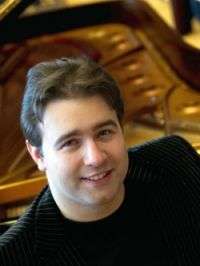|
Back
The Sound of One Hand Playing New York
Avery Fisher Hall, Lincoln Center
03/29/2009 -
Sergei Prokofiev: Symphony No. 3 in C Minor, Opus 44 – Piano Concerto No. 4 in B-flat major, Opus 53 – Symphony No. 4 in C major, Opus 112 (revised version)
Alexei Volodin (Piano)
London Symphony Orchestra, Valery Gergiev (Conductor)

Alexei Volodin (© Andrea Felvégi)
Once again, it took but a moment to show why Valery Gergiev is far and above the most exciting conductor of Russian music since Serge. Koussevitzky. (Or perhaps, since ever!)
That moment was in the first measure of the first work played, the sometimes frenetic Third Symphony, a piece written in the iconic key of C minor. Prokofiev was not one to give homage to a mere Beethoven, so this work was an homage to his own opera, The Flaming Angel (which, while about insanity, was the only work he ever wrote about religion). And yes, he took themes from that opera, changed them around, and arrived with one of the most stunning of all his symphonies.
When played by anybody else, the Third Symphony first movement gives the impression of sheer chaos. When played by Maestro Gergiev, instead of the dissonant opening chords, the piece began with a steady, pounding, almost inhumanly tense rhythm, a rhythm which continued throughout the entire movement.
The entire London Symphony Orchestra participated in this feverishly intense opening. But unlike the Second Symphony, which was “fire and steel”, this was more a mental trial, trying both the audience and the orchestra.
The second movement was another test for the LSO, this for its strings. Prokofiev didn’t need to work for strange effects, but the counterpoint of strings, buzzing, hushed, contrasting with themselves, seemed almost like a piece of Bartók night music. By the time of the finale, Gergiev had led a faultless orchestral tapestry to an almost pulverizing drama.
It is inescapable, while listening to Gergiev play all the Prokofiev works, that their artistic aims vary completely from one to the other. The trademarks have a similarity—the sudden changes of keys, rhythms, themes without any introductions to the changes—but the results are dissimilar.
The second work, the Fourth Piano Concerto, is not so much a concerto as an ingenuous tour de force. Prokofiev had been commissioned—along with Strauss, Ravel, Reger and others—to write a piece for the left hand alone. Pianist Wittgenstein had his arm amputated during the First World War, but he still had enough money to “buy” his favorite composers.
The Ravel work is a masterpiece, I happen to love the Richard Strauss (though nobody else does), but the Prokofiev is, to say the least, without much substance. It does take a whole lot of fingering by any artist, and Alexei Volodin, a longtime collaborator with Gergiev, played the music with great élan (if not much poetry).
But one can’t really make poetry from a work which simply shows off the pianist’s virtuosity, great as it may be. So Volodin had to show that, yes, he has a right hand too. And what a right hand!! He played the toccata from the Seventh Sonata, a piece which crashes and bangs and ends with total violence. The audience obviously was more impressed with two hands than one, and they gave him a deserved huge hand after the performance.
The second half was devoted to the revised Fourth Symphony. The original Fourth Symphony will be played for the final Gergiev performance tonight, so I shall postpone comments on that major work until the Maestro raises his baton once again.
Harry Rolnick
|